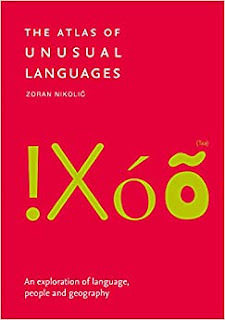Unfortunately, a frustrating read
3 steloj
I'm fascinated by linguistics and the way in which languages have evolved throughout human history so I leapt at the chance to review Zoran Nikolic's new global study, The Atlas of Unusual Languages. He's researched dozens of languages and dialects from every continent, focusing particularly on ones which are now what he calls 'language islands' - pockets where a language, frequently one originating thousands of miles away, still remains in use today. The book contains lots of details about each language including theories about its history, its linguistic evolution and family grouping, and snippets of information concerning the people who speak these often endangered languages. I didn't know that UNESCO maintains a list of endangered languages or, indeed, quite how many of them there are.
Nikolic crams mind-boggling volumes of facts and theories into The Atlas of Unusual Languages, but while this is great if the book is treated as …
I'm fascinated by linguistics and the way in which languages have evolved throughout human history so I leapt at the chance to review Zoran Nikolic's new global study, The Atlas of Unusual Languages. He's researched dozens of languages and dialects from every continent, focusing particularly on ones which are now what he calls 'language islands' - pockets where a language, frequently one originating thousands of miles away, still remains in use today. The book contains lots of details about each language including theories about its history, its linguistic evolution and family grouping, and snippets of information concerning the people who speak these often endangered languages. I didn't know that UNESCO maintains a list of endangered languages or, indeed, quite how many of them there are.
Nikolic crams mind-boggling volumes of facts and theories into The Atlas of Unusual Languages, but while this is great if the book is treated as an occasional dip-into tome, I found its presentation made it hard work to just read. There is no overarching narrative linking each entry so the book is essentially an encyclopedia of facts with limited explanations. I did love the way a passage from The Little Prince is repeatedly translated into many of the Latin-alphabet languages thereby allowing readers an opportunity to see these languages 'in action' and to compare how those of the same family diverge. Again though, these passages are simply presented to the reader, but with no attempt at linguistic explanation. I'm not sure what the target readership is for The Atlas of Unusual Languages, but unfortunately I found it quite a frustrating read.

